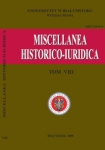Orzecznictwo karno-administracyjne w zakresie dostaw obowiązkowych płodów rolnych w Polsce Ludowej
Decisions of Petty Offences Administrative Tribunals Concerning Compulsory Delivery of Agriculture Products in People’s Poland
Author(s): Marcin ŁyskoSubject(s): Law, Constitution, Jurisprudence, Agriculture, History of Law, Post-War period (1950 - 1989), History of Communism
Published by: Wydawnictwo Uniwersytetu w Białymstoku
Keywords: compulsory delivery; petty offences law;
Summary/Abstract: The compulsory delivery of agriculture products in Poland was introduced in 1951. The Communist government wanted to control agriculture production in this way. The shortages of food in towns caused big political problems and the communists tried to control farmers by the administrative and penal repression. In 1952 boards judging petty offences were established and they punished farmers by fines. They were high, especially for richer farmers “kulaks”, but for all groups of farmers they were severe. The efficiency of these fines was not very high, because farmers did not want to pay. Then the authorities introduced an arrest as a substitutive penalty, if the farmer didn’t pay the fine. This penalty gave good results – farmers started fulfilling the deliveries, but the system was very repressive. In 1955, when first syndromes of post-Stalin thaw started, the system became less repressive. In 1956 the range of the compulsory delivery was reduced and economic measures were applied to those, who didn’t fulfill the duty. They were abolished in 1971.
Journal: Miscellanea Historico-Iuridica
- Issue Year: 8/2009
- Issue No: 2
- Page Range: 189-221
- Page Count: 33
- Language: Polish

